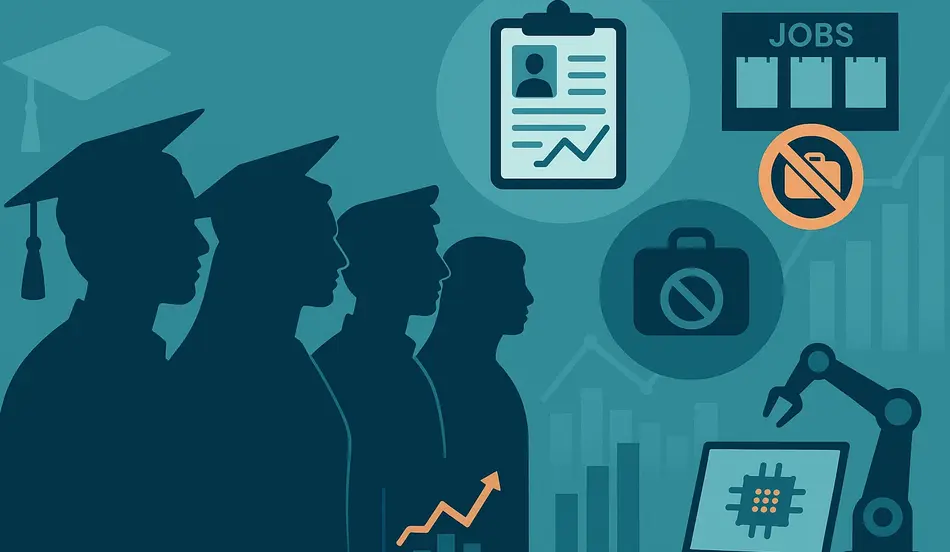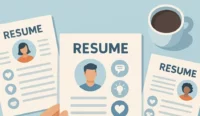Introduction: AI’s Double-Edged Impact on the Job Market
Artificial intelligence is driving unprecedented gains in productivity, stock market growth, and corporate efficiency. For many large companies, AI is even helping buffer the effects of tariffs and global trade shifts. But there’s a darker side to this technological revolution: it’s becoming one of the top five causes of job losses in 2025, according to career transition firm Challenger, Gray & Christmas.
A recent Wall Street Journal report reveals a troubling trend — many young, highly educated Americans are finding themselves shut out of the workforce. The very tools that help companies grow are also making certain entry-level positions obsolete, leaving recent college graduates unemployed or underemployed.
The Hidden Struggle for New Graduates
Industries with Rising Productivity, Falling Demand
It’s no surprise that tech jobs are being reshaped by AI. But what’s more surprising is that the same trend is hitting other professional fields. According to employers and recruiters interviewed by the WSJ, sectors like marketing, business operations, finance, and even traditional back-end administrative roles are seeing reduced hiring for recent graduates.
The reason? Many of these tasks — from data entry to basic content creation — can now be done faster, cheaper, and more consistently by AI-powered systems. Hiring managers are increasingly deciding to lean on automation instead of hiring or replacing junior staff.
The Numbers Behind the Trend
The unemployment rate for U.S. workers with a bachelor’s degree or higher sits at 2.7%, lower than the overall unemployment rate of 4.2%. But within that number, the story is more complicated. Research from the Burning Glass Institute shows that unemployment for recent graduates aged 22–27 has risen faster than for workers with only an associate degree or even just a high school diploma.
These graduates are often unable to find roles that require their degree, pushing them into jobs where they are overqualified and underpaid — a trend known as underemployment. Since the pandemic, underemployment rates for college grads have climbed sharply, adding financial and career pressure to a generation already burdened with student debt.
Why Entry-Level Roles Are Disappearing
AI’s Efficiency Cuts Out the First Rung of the Career Ladder
Many industries have historically relied on junior staff to handle repetitive, lower-skill tasks that allow them to gain experience and grow into more complex roles. Today, AI can complete much of that work without breaks, salaries, or onboarding time.
From payroll processing to marketing analytics to customer data management, AI has eliminated the need for large entry-level teams. As a result, graduates are now competing for a smaller pool of jobs, many of which still require multiple years of experience.
The Communication and Marketing Squeeze
If you’re a graduate entering fields like communications, marketing, or public relations, you’re facing some of the toughest competition. These industries are rapidly adopting AI for copywriting, campaign management, and social media scheduling — roles that were once filled by junior associates.
Without strategic or creative specialization, these jobs are at higher risk of being automated entirely.
Kickstart Your Career Despite AI Disruption
Search WhatJobs for entry-level and graduate roles—connect with employers looking for fresh talent in 2025’s changing job market.
Search Graduate Jobs →Strategies for Graduates to Stay Employable
1. Target Human-Centric Roles
Experts recommend focusing on jobs that require face-to-face interaction, strategic thinking, or high-level problem-solving — areas where AI is less effective. Client-facing positions, consultative sales, and roles that require nuanced judgment tend to be safer from full automation.
2. Build Skills AI Can’t Easily Replicate
While technical knowledge is valuable, pairing it with skills like leadership, relationship management, and creative problem-solving can make you harder to replace. This aligns with WhatJobs’ list of top soft skills companies want in 2025.
3. Start Early
College career coaches now advise students to begin career planning in their freshman year. Internships, networking, and building a personal portfolio early can dramatically improve employability after graduation.
4. Avoid the “Experience Trap”
Some graduates spend years applying for jobs that require unrealistic amounts of experience for entry-level positions. Instead, look for apprenticeships, contract roles, or smaller companies where you can demonstrate your value quickly.
The Growing Challenge of Underemployment
Underemployment isn’t just about earning less than you hoped — it can have long-term career consequences. Graduates who start in roles unrelated to their degree often find it harder to transition into their desired field later.
A National Association of Colleges and Employers study found that starting in a role aligned with your field of study significantly increases lifetime earnings potential. This makes strategic early career decisions critical for today’s graduates.
Conclusion: Adapting to the AI Job Market
AI isn’t going away — in fact, it’s only going to become more deeply integrated into the workplace. For college graduates, the challenge is clear: you need to position yourself in roles where your human skills are indispensable.
That means focusing on work that requires creativity, empathy, strategy, and interpersonal connection — and starting your career planning much earlier than previous generations.
FAQ – AI and College Graduate Unemployment 2025
Q1: Why are college graduates struggling to find jobs in 2025?
A1: AI automation has reduced demand for entry-level roles, especially in fields like marketing, finance, and business operations. This has led to higher unemployment and underemployment rates among recent grads.
Q2: What is underemployment, and why is it a problem?
A2: Underemployment occurs when graduates work in jobs that don’t require their degree. It can limit career growth and reduce lifetime earning potential.
Q3: How can graduates protect their careers from AI automation?
A3: Focus on human-centric roles, develop strategic and creative skills, and start networking and gaining experience early in college.
Q4: Are any industries safe from AI disruption?
A4: While no industry is completely safe, roles requiring direct human interaction, complex decision-making, or creative innovation are less likely to be automated.






